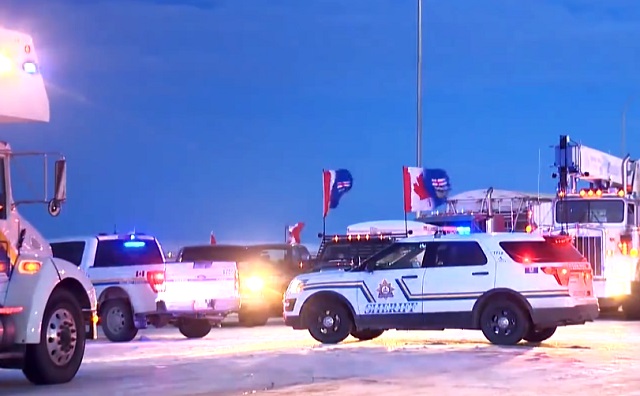Alberta
Trudeau-appointed judge sentences Freedom Convoy-inspired protesters to 6 years in prison

From LifeSiteNews
Justice David Labrenz sentenced Anthony Olienick and Chris Carbert, who were charged with mischief and weapons offenses during the 2022 Freedom Convoy-inspired border blockade in Alberta.
A Trudeau-appointed judge serving in an Alberta court has sentenced two men linked to the 2022 Freedom Convoy-inspired border blockade protest in Coutts, Alberta, to six years in prison.
On September 9, Alberta Court of King’s Bench Justice David Labrenz sentenced Anthony Olienick and Chris Carbert, who were convicted of mischief and weapons offenses stemming from the Coutts border blockade, to six years in prison.
“Stay strong, live free, spread love – not war,” Olienick declared before being sentenced.
“I’ve gained a stronger understanding into what divine destiny awaits me,” he added. “I will continue to help others spreading truth, happiness and joy. Unifying people together by using love as my solemn weapon.”
Labrenz, who was appointed to the Alberta bench by Prime Minister Justin Trudeau in 2018, sentenced Olienick to six years but gave Carbert an additional six months, putting his sentence at six and a half years. However, neither man is expected to serve their full sentence, as both were issued four years of credit for time already served. Both are also prohibited from owning firearms for life, and are required to provide a DNA sample.
Both men have been jailed since February 2022 when they were charged with conspiracy to commit murder during the protest in Coutts, which ran parallel to but was not officially affiliated with, the Freedom Convoy taking place in Ottawa.
Earlier in August, they were finally acquitted of the conspiracy to commit murder charge, but were still found guilty of the lesser charges of unlawful possession of a firearm for a dangerous purpose and mischief over $5,000. Olienick was also found guilty of unlawful possession of an explosive device.
At the time, police said they had discovered firearms, 36,000 rounds of ammunition, and industrial explosives at Olienick’s home. However, the guns were legally obtained and the ammunition was typical of those used by rural Albertans. Similarly, Olienick explained that the explosives were used for mining gravel.
The men were arrested alongside Christopher Lysak and Jerry Morin, with the latter two pleading guilty to lesser charges to avoid trial. At the time, the “Coutts Four” were painted as dangerous terrorists and their arrest was used as justification for the invocation of the Emergencies Act by the Trudeau government, which allowed it to use draconian measures to end both the Coutts blockade and the much larger Freedom Convoy occurring thousands of kilometers away in Ottawa.
Under the EA, the Trudeau government froze the bank accounts of Canadians who donated to the protest. Trudeau revoked the EA on February 23 after the protesters had been cleared out. At the time, seven of Canada’s 10 provinces opposed Trudeau’s use of the EA.
Since then, Federal Court Justice Richard Mosley ruled that Trudeau was “not justified” in invoking the Emergencies Act, a decision which the federal government is appealing.
As LifeSiteNews previously reported, Labrenz’s decision follows a recommendation from the Crown prosecutor for each of the men to serve nine years in prison.
Many Canadians online are condemning the ruling, arguing that the men are being treated in a way that is comparable to political prisoners in communist countries.
“Unbelievable. They made an example out of them. Canada is gone as we know it,” one user lamented.
Others questioned why the two Alberta men were denied bail for two years while dangerous criminals are allowed to roam free under the Trudeau government’s “catch and release” policy.
“Meanwhile, a guy out on parole for assault (and 60+ other “police interactions”) cut off one man’s head and another’s hand in broad daylight in downtown Vancouver…” one commented.
Indeed, this policy has put many Canadians in danger, as was the case last month when a Brampton man charged with sexually assaulting a 3-year-old was reportedly out on bail for an October 2022 incident in which he was charged with assault with a dangerous weapon and possession of a dangerous weapon.
Alberta
Made in Alberta! Province makes it easier to support local products with Buy Local program

Show your Alberta side. Buy Local. |
When the going gets tough, Albertans stick together. That’s why Alberta’s government is launching a new campaign to benefit hard-working Albertans.
Global uncertainty is threatening the livelihoods of hard-working Alberta farmers, ranchers, processors and their families. The ‘Buy Local’ campaign, recently launched by Alberta’s government, encourages consumers to eat, drink and buy local to show our unified support for the province’s agriculture and food industry.
The government’s ‘Buy Local’ campaign encourages consumers to buy products from Alberta’s hard-working farmers, ranchers and food processors that produce safe, nutritious food for Albertans, Canadians and the world.
“It’s time to let these hard-working Albertans know we have their back. Now, more than ever, we need to shop local and buy made-in-Alberta products. The next time you are grocery shopping or go out for dinner or a drink with your friends or family, support local to demonstrate your Alberta pride. We are pleased tariffs don’t impact the ag industry right now and will keep advocating for our ag industry.”
Alberta’s government supports consumer choice. We are providing tools to help folks easily identify Alberta- and Canadian-made foods and products. Choosing local products keeps Albertans’ hard-earned dollars in our province. Whether it is farm-fresh vegetables, potatoes, honey, craft beer, frozen food or our world-renowned beef, Alberta has an abundance of fresh foods produced right on our doorstep.
Quick facts
- This summer, Albertans can support local at more than 150 farmers’ markets across the province and meet the folks who make, bake and grow our food.
- In March 2023, the Alberta government launched the ‘Made in Alberta’ voluntary food and beverage labelling program to support local agriculture and food sectors.
- Through direct connections with processors, the program has created the momentum to continue expanding consumer awareness about the ‘Made in Alberta’ label to help shoppers quickly identify foods and beverages produced in our province.
- Made in Alberta product catalogue website
Related information
Alberta
Province to expand services provided by Alberta Sheriffs: New policing option for municipalities

Expanding municipal police service options |
Proposed amendments would help ensure Alberta’s evolving public safety needs are met while also giving municipalities more options for local policing.
As first announced with the introduction of the Public Safety Statutes Amendment Act, 2024, Alberta’s government is considering creating a new independent agency police service to assume the police-like duties currently performed by Alberta Sheriffs. If passed, Bill 49 would lay additional groundwork for the new police service.
Proposed amendments to the Police Act recognize the unique challenges faced by different communities and seek to empower local governments to adopt strategies that effectively respond to their specific safety concerns, enhancing overall public safety across the province.
If passed, Bill 49 would specify that the new agency would be a Crown corporation with an independent board of directors to oversee its day-to-day operations. The new agency would be operationally independent from the government, consistent with all police services in Alberta. Unlike the Alberta Sheriffs, officers in the new police service would be directly employed by the police service rather than by the government.
“With this bill, we are taking the necessary steps to address the unique public safety concerns in communities across Alberta. As we work towards creating an independent agency police service, we are providing an essential component of Alberta’s police framework for years to come. Our aim is for the new agency is to ensure that Albertans are safe in their communities and receive the best possible service when they need it most.”
Additional amendments would allow municipalities to select the new agency as their local police service once it becomes fully operational and the necessary standards, capacity and frameworks are in place. Alberta’s government is committed to ensuring the new agency works collaboratively with all police services to meet the province’s evolving public safety needs and improve law enforcement response times, particularly in rural communities. While the RCMP would remain the official provincial police service, municipalities would have a new option for their local policing needs.
Once established, the agency would strengthen Alberta’s existing policing model and complement the province’s current police services, which include the RCMP, Indigenous police services and municipal police. It would help fill gaps and ensure law enforcement resources are deployed efficiently across the province.
Related information
-

 Business2 days ago
Business2 days agoChina, Mexico, Canada Flagged in $1.4 Billion Fentanyl Trade by U.S. Financial Watchdog
-

 espionage2 days ago
espionage2 days agoEx-NYPD Cop Jailed in Beijing’s Transnational Repatriation Plot, Canada Remains Soft Target
-

 2025 Federal Election2 days ago
2025 Federal Election2 days agoBREAKING from THE BUREAU: Pro-Beijing Group That Pushed Erin O’Toole’s Exit Warns Chinese Canadians to “Vote Carefully”
-

 Daily Caller2 days ago
Daily Caller2 days agoTrump Executive Orders ensure ‘Beautiful Clean’ Affordable Coal will continue to bolster US energy grid
-

 2025 Federal Election2 days ago
2025 Federal Election2 days agoAllegations of ethical misconduct by the Prime Minister and Government of Canada during the current federal election campaign
-

 Daily Caller2 days ago
Daily Caller2 days agoDOJ Releases Dossier Of Deported Maryland Man’s Alleged MS-13 Gang Ties
-

 Energy2 days ago
Energy2 days agoStraits of Mackinac Tunnel for Line 5 Pipeline to get “accelerated review”: US Army Corps of Engineers
-

 Opinion2 days ago
Opinion2 days agoLeft Turn: How Viet Nam War Resisters Changed Canada’s Political Compass



